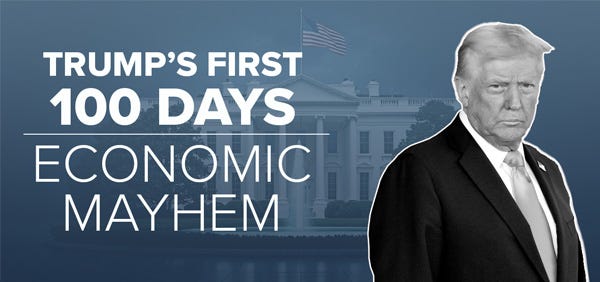Chaotic Tariff Policy Will Do Wide-Ranging Harm to Main Street, Consumers, and Small Businesses as well as the Banking and Financial Markets
By Amanda Fischer, Policy Director and COO
The U.S. financial markets are the envy of the world, and the trust and confidence that consumers and businesses have in them exists because there are clear and enforceable rules that govern them. President Trump’s sweeping, on-again-off-again tariff announcements have put that trust at risk, however, and will have devastating implications beyond U.S. trade policy and our nation’s geopolitical standing in the world, harming Main Street families and small businesses.
This is no longer about the cost of a dozen eggs at the grocery store. The stakes are now much higher and now have endangered American families’ livelihoods and financial futures. In the past week, Americans have experienced losses to their retirement savings not seen since the COVID-19 pandemic. While the stock market rebounded upon the Administration’s announcement to delay the tariffs, uncertainty remains and families cannot feel confident about their futures. To make matters worse, this chaos is happening while the administration hobbles the Consumer Financial Protection Bureau and other financial watchdogs from the SEC and FDIC to the Fed and FSOC are focused on deregulation, political agendas, and reeling from staffing cuts. In other words, there are fewer cops on the beat and no one prioritizing protecting Americans’ dwindling savings and preventing financial crashes and bailouts.

In addition to the massive declines in the equity market that have quickly eroded Americans’ retirement funds, the recent chaos in trade policy has exacerbated existing fragilities in our financial system that could disrupt everything from the Treasury market to home purchases to the safety and soundness of Main Street banks.
While there is still a lot of uncertainty about the size of the tariffs and how they will be implemented, it is certain that there are many avenues for harm to our financial markets and banking system, including:
Treasury Market: Recent reporting suggests that hedge funds have abruptly and precipitously liquidated their so-called U.S. Treasury “basis trades.” As a result, yields on U.S. Treasury bonds have jumped. Turmoil in the Treasury markets doesn’t just affect the rate at which the United States can borrow to fund our critical government services. Treasuries also underlie trillions in short-term borrowing that allows our financial system to run smoothly and serve as collateral in many other financial transactions, and large movements can have severe knock-on effects throughout the financial system.
Mortgage Market: The mortgage-backed securities market, which has similar investors to Treasuries, might also experience turbulence, as it did in March 2020. This could limit the availability of mortgages for families looking to purchase a home. Additionally, the higher market rates for Treasuries mean higher mortgage rates, making homes less affordable or simply out of reach for American families, particularly low-income or first-time buyers.
Consumer and Small Business Borrowing: Higher Treasury market rates would make all loans more expensive. This would especially hurt consumers (via higher credit card interest rates) and small businesses that rely on loans from banks. Also, those who already have debt with variable rates will face higher costs and have a harder time meeting their monthly payments.
Money Market and Open-End Funds: Government money market funds in particular and other open-ended funds could see large-scale redemptions from people who are trying to protect their savings. Large-scale redemptions would push these funds towards failure (and potential bailouts as happened in 2008 and 2020).
Margin in Financial Markets: Treasuries serve as collateral for trillions in financial transactions, and large movements in their prices can result in substantial “margin calls,” or cash that is needed to makeup for the fall in Treasury prices (as recently occurred for hedge funds). Large margin calls can lead to further sales of Treasuries and other securities, potentially resulting in further margin calls and turmoil in the markets for other financial assets. Also, if a firm already is in financial trouble, margin calls can push it towards failure.
Securitized Products: Collateralized loan obligations (CLOs) already have experienced a large sell-off since these securities typically pay variable rates that are based on Treasuries. Similar sell offs could occur for other securitized products with underlying variable rate debt.
Credit Risk/Recession: Financial instability can increase the risk of loan defaults, which hurts banks, especially community banks that rely on traditional banking activities such as lending to families and businesses. Borrowers may find it harder to repay loans, leading to higher loan defaults, which hurt banks and could even lead to more bank failures.
Market Confidence: Financial market turmoil can erode confidence in the banking sector, leading to a decline in bank stock prices and increased volatility. After outperforming the broader stock market in the past several months, certain financial stocks have fallen more than the broader market in recent days.



